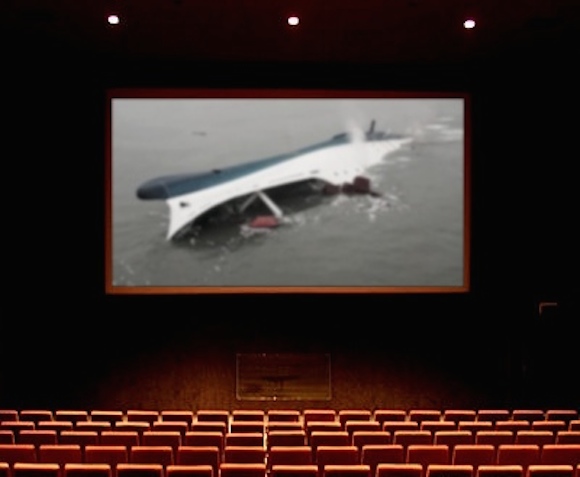
After a tragedy like the April 16 sinking of the South Korean ferry Sewol, many are left wondering how to appropriately commemorate the lives lost without forgetting the awful truth of the actual incident. Last week a South Korean newspaper revealed that a two-hour documentary about the accident is being planned to be released next year to coincide with the one-year anniversary. The film’s backers are relying solely on donations and are seeking just 400 million won (US$392,000) to finance the low-budget project. And with the entire country paying extremely close attention to every tragic detail to come out of the investigations surrounding the accident, this film is destined to be an instant hit in Korean movie theaters.
The documentary is set to be called “A Goose’s Dream” after a song that high schooler Lee Bo Mee sang at a school festival. Lee was one of the 293 people who died in the accident and she sacrificed her own life while the Sewol sank to save others. Although any further details about the contents of the film weren’t revealed, the documentary will likely cover many aspects of the accident from the criticism of the government’s response to the intense media coverage of the sinking.
The filmmakers have said that they will use about 300 million won ($294,321) for production costs and spend the remaining 100 million won ($98,107) for advertisement. In October, they expect to have a 30-minute clip finished and plan to show it for free.
Although some Japanese netizens wondered if this was too soon to be making a film after the tragedy, others argued that it will always be “too soon” and that shouldn’t prevent people from moving forward. But with such a low budget, netizens worried that the quality of the documentary would be pretty poor and cynically thought this was to increase profits since any movie about the Sewol is likely to sell out across Korea.
With the death toll yet to be finalized as 11 people remain missing and the government is still investigating the details leading up to the Sewol’s final days, this tragedy is far from over and a two-hour documentary will probably not be able to cover every angle of the disaster. But for a country that has been mourning the almost 300 deaths of mostly high schoolers, the film could possibly be one way to continue to come to grips with what happened last April.
Feature Image: Wikipedia, Wikipedia edited by RocketNews24
Source: Alfafa

 Questions raised over the mental state of Korean ferry captain
Questions raised over the mental state of Korean ferry captain South Korean government blamed for incompetent response to Sewol ferry disaster
South Korean government blamed for incompetent response to Sewol ferry disaster Pulling up the Sewol could take six months and cost US$98,240,000
Pulling up the Sewol could take six months and cost US$98,240,000 South Korean ferry disaster: Rescue ship was fitted with salmon-fishing sonar
South Korean ferry disaster: Rescue ship was fitted with salmon-fishing sonar Japanese government mulling indoor smoking ban to be introduced as early as next year
Japanese government mulling indoor smoking ban to be introduced as early as next year McDonald’s new Happy Meals offer up cute and practical Sanrio lifestyle goods
McDonald’s new Happy Meals offer up cute and practical Sanrio lifestyle goods All-you-can-drink Starbucks and amazing views part of Tokyo’s new 170 meter-high sky lounge
All-you-can-drink Starbucks and amazing views part of Tokyo’s new 170 meter-high sky lounge Super Nintendo World expansion gets delayed for several months at Universal Studios Japan
Super Nintendo World expansion gets delayed for several months at Universal Studios Japan Studio Ghibli releases new action figures featuring Nausicaä of the Valley of the Wind characters
Studio Ghibli releases new action figures featuring Nausicaä of the Valley of the Wind characters Studio Ghibli glasses cases let anime characters keep an eye on your spectacles
Studio Ghibli glasses cases let anime characters keep an eye on your spectacles Beautiful Sailor Moon manhole cover coasters being given out for free by Tokyo tourist center
Beautiful Sailor Moon manhole cover coasters being given out for free by Tokyo tourist center McDonald’s Japan releases a pancake pie for new retro kissaten coffeeshop series
McDonald’s Japan releases a pancake pie for new retro kissaten coffeeshop series Kyoto’s 100 Demons yokai monster parade returns!
Kyoto’s 100 Demons yokai monster parade returns! Tokyo has a cafe lounge that’s for negative people only
Tokyo has a cafe lounge that’s for negative people only Manga artist raises question online about false perspective in Ghibli film My Neighbor Totoro
Manga artist raises question online about false perspective in Ghibli film My Neighbor Totoro Disney princesses get official manga makeovers for Manga Princess Cafe opening in Tokyo
Disney princesses get official manga makeovers for Manga Princess Cafe opening in Tokyo More foreign tourists than ever before in history visited Japan last month
More foreign tourists than ever before in history visited Japan last month Starbucks reopens at Shibuya Scramble Crossing with new look and design concept
Starbucks reopens at Shibuya Scramble Crossing with new look and design concept Beautiful new Final Fantasy T-shirt collection on the way from Uniqlo【Photos】
Beautiful new Final Fantasy T-shirt collection on the way from Uniqlo【Photos】 Is the new Shinkansen Train Desk ticket worth it?
Is the new Shinkansen Train Desk ticket worth it? Foreign English teachers in Japan pick their favorite Japanese-language phrases【Survey】
Foreign English teachers in Japan pick their favorite Japanese-language phrases【Survey】 Japanese convenience store packs a whole bento into an onigiri rice ball
Japanese convenience store packs a whole bento into an onigiri rice ball We try out “Chan Ramen”, an underground type of ramen popular in the ramen community
We try out “Chan Ramen”, an underground type of ramen popular in the ramen community Studio Ghibli releases Kiki’s Delivery Service chocolate cake pouches in Japan
Studio Ghibli releases Kiki’s Delivery Service chocolate cake pouches in Japan Japan’s bone-breaking and record-breaking roller coaster is permanently shutting down
Japan’s bone-breaking and record-breaking roller coaster is permanently shutting down New definition of “Japanese whiskey” goes into effect to prevent fakes from fooling overseas buyers
New definition of “Japanese whiskey” goes into effect to prevent fakes from fooling overseas buyers Our Japanese reporter visits Costco in the U.S., finds super American and very Japanese things
Our Japanese reporter visits Costco in the U.S., finds super American and very Japanese things Studio Ghibli unveils Mother’s Day gift set that captures the love in My Neighbour Totoro
Studio Ghibli unveils Mother’s Day gift set that captures the love in My Neighbour Totoro Foreign passenger shoves conductor on one of the last full runs for Japan’s Thunderbird train
Foreign passenger shoves conductor on one of the last full runs for Japan’s Thunderbird train Domino’s Japan now sells…pizza ears?
Domino’s Japan now sells…pizza ears? New Japanese KitKat flavour stars Sanrio characters, including Hello Kitty
New Japanese KitKat flavour stars Sanrio characters, including Hello Kitty Kyoto creates new for-tourist buses to address overtourism with higher prices, faster rides
Kyoto creates new for-tourist buses to address overtourism with higher prices, faster rides Sales of Japan’s most convenient train ticket/shopping payment cards suspended indefinitely
Sales of Japan’s most convenient train ticket/shopping payment cards suspended indefinitely Sold-out Studio Ghibli desktop humidifiers are back so Totoro can help you through the dry season
Sold-out Studio Ghibli desktop humidifiers are back so Totoro can help you through the dry season Japanese government to make first change to romanization spelling rules since the 1950s
Japanese government to make first change to romanization spelling rules since the 1950s Ghibli founders Toshio Suzuki and Hayao Miyazaki contribute to Japanese whisky Totoro label design
Ghibli founders Toshio Suzuki and Hayao Miyazaki contribute to Japanese whisky Totoro label design Doraemon found buried at sea as scene from 1993 anime becomes real life【Photos】
Doraemon found buried at sea as scene from 1993 anime becomes real life【Photos】 Tokyo’s most famous Starbucks is closed
Tokyo’s most famous Starbucks is closed One Piece characters’ nationalities revealed, but fans have mixed opinions
One Piece characters’ nationalities revealed, but fans have mixed opinions We asked a Uniqlo employee what four things we should buy and their suggestions didn’t disappoint
We asked a Uniqlo employee what four things we should buy and their suggestions didn’t disappoint Princesses, fruits, and blacksmiths: Study reveals the 30 most unusual family names in Japan
Princesses, fruits, and blacksmiths: Study reveals the 30 most unusual family names in Japan Tokyo University of the Arts to offer graduate program in video game design next year
Tokyo University of the Arts to offer graduate program in video game design next year Model criticised for posting mocked-up “drowning selfie” as South Korean ferry sinks
Model criticised for posting mocked-up “drowning selfie” as South Korean ferry sinks Shinkai’s “Your Name” tops South Korean box office with US$8.1 million
Shinkai’s “Your Name” tops South Korean box office with US$8.1 million Japanese film “Behind THE COVE” defends whaling and dolphin-hunting, screens in the U.S.【Video】
Japanese film “Behind THE COVE” defends whaling and dolphin-hunting, screens in the U.S.【Video】 Japanese Americans tell STORIES FROM TOHOKU
Japanese Americans tell STORIES FROM TOHOKU Japanese rock legend Yoshiki to be honored with a handprint ceremony in Hollywood
Japanese rock legend Yoshiki to be honored with a handprint ceremony in Hollywood Evangelion Valentine’s Day chocolates already teased for next year
Evangelion Valentine’s Day chocolates already teased for next year Toronto Film Festival to host North American premiere of Princess Kaguya, Ghibli documentary
Toronto Film Festival to host North American premiere of Princess Kaguya, Ghibli documentary Japanese government to outlaw carrying unbound knives on trains starting next year
Japanese government to outlaw carrying unbound knives on trains starting next year South Korea establishes special task force to combat escalators and elevators
South Korea establishes special task force to combat escalators and elevators National Film Archive of Japan releases shocking historical videos of 1923 Great Kanto Earthquake
National Film Archive of Japan releases shocking historical videos of 1923 Great Kanto Earthquake Parasite movie releases free official wallpapers to download as backgrounds for video calls
Parasite movie releases free official wallpapers to download as backgrounds for video calls Japan’s pet kitties are reportedly spellbound by recent NHK wildlife documentary 【Photos】
Japan’s pet kitties are reportedly spellbound by recent NHK wildlife documentary 【Photos】 South Korea protests Olympic figure skating result over biased judging
South Korea protests Olympic figure skating result over biased judging Spider-Man director to reboot horror flick The Grudge
Spider-Man director to reboot horror flick The Grudge Heartwarming video tells the story of a blind man and his armless friend who planted a forest
Heartwarming video tells the story of a blind man and his armless friend who planted a forest
Leave a Reply